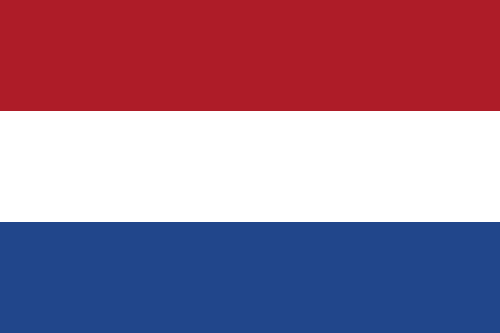
Country Flags by Continent
|
|
The flag of the Netherlands is a horizontal tricolour of red, white, and blue. Introduced in 1572, it is one of the first tricolours and the oldest tricolour still in use today. Since 1937, the flag has officially been the national flag of the Netherlands and of the Kingdom of the Netherlands.
Description
The national flag of the Netherlands is a tricolor flag. The horizontal fesses are bands of equal size in the colours, from top to bottom, red (officially described as a "bright vermilion"), white (silver), and blue ("cobalt blue"). The flag proportions (width:length) are 2:3. The first stadtholder of the Dutch Republic was William I of Orange, who joined with Dutch nationalists and led the struggle for independence from Spain. Partly out of respect for him, the first flag adopted by the Dutch was a horizontal tricolour of orange, white, and blue. It became known as the Prinsenvlag ("Prince's flag") and was based on the livery of William of Orange. The orange dye was particularly unstable and tended to turn red after a while, so in the mid-17th century, red was made the official color. The flag has flown since then, but was confirmed by Royal Decree only in 1937, at the same time the colour parameters were exactly defined. As the first revolutionary flag, it has had a seminal influence throughout the world, particularly on the Pan-Slavic colors of Russia. Until about 1800, in the case of both the orange- and the red-striped versions, the number of stripes and their order frequently varied. |

